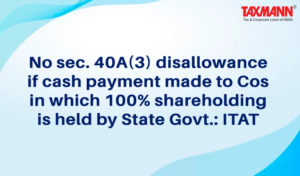No sec. 40A(3) disallowance if cash payment made to Cos in which 100% shareholding is held by State Govt.: ITAT
- Blog|News|Income Tax|
- 3 Min Read
- By Taxmann
- |
- Last Updated on 10 May, 2022

Case Details: DCIT v. Vinod Arora - [2022] 137 taxmann.com 450 (Amritsar-Trib.)
Judiciary and Counsel Details
-
- Ravish Sood, Judicial Member & DR. M.L. Meena, Accountant Member
- P.N. Arora, Adv. for the Appellant.
- Trilochan Singh and P.S. Khalsa, DR for the Respondent.
Facts of the Case
During the year, the assessee purchased wine from two entities, namely, RSGSML and RSBCL. The payment was made by the assessee to the aforesaid parties in cash. The Assessing Officer (AO) disallowed said payment on the ground of contravention of the provisions of section 40A(3).
On appeal, the Commissioner (Appeals) held that the provisions of section 40A(3) would not stand triggered as the assessee had made the payments to the State Government undertakings. Aggrieved-AO filed the instant appeal before the Tribunal.
ITAT Held
The Tribunal held that rule 6DD(b) saves from disallowance under section 40A(3) if payment is made to the Government and such payment is made in legal tender.
The first requirement of the Rule was the entities to whom payments were made would fall within the meaning of “Government”. If a body was found to be an instrumentality or the agency of the Government, then, it would be an authority included in the term “State” under Article 12 of the Constitution of India. The definition of “the State” therein provided, though inclusive and not exclusive, included, viz.
a) The Government and Parliament of India;
b) The Government and the Legislature of each of the States;
c) All local and other authorities within the territory of India; and
d) All local and other authorities are under the control of the Government of India.
In the given case, the 100 percent shareholdings of two undertakings, to whom payments were made, are held by the State Government. There is an existence of deep and pervasive control of the State Government on the said undertakings, and the full control of their working, policy, and framework was vested with the State Government. Therefore, they could safely be brought within the meaning of “State”.
Now the next requirement as contemplated in rule 6DD(b) is that the payment is required to be made in legal tender. The term legal tender hasn’t been defined in the Income-tax Act.
However, the dictionary meaning of “legal tender” as mentioned in “Aiyer’s Law Terms and Phrases”, is “the coinage of a country in which debts may be paid and which the creditor is bound to accept”. The dictionary meaning of the coin is; “metal used for the time being as money and stamped and issued by the authorities of the state in order to be used.”
Thus, it could be said that “legal tender” means the currency of a state which is to be used as money. The assessee made payment in Indian currency. Accordingly, it could be safely concluded that the same had been made in legal tender.
In view of aforesaid observations, it was to be held that the payments made by the assessee to the State Government entities in the legal tender were covered by the exception contemplated in rule 6DD(b).
List of Cases Reviewed
-
- Som Prakash Rekhi v. Union of India AIR 1981 SC 212 (para 7)
- Smt. Sapna Sanjay Raisoni v. ITO [2016] 70 taxmann.com 7/159 ITD 1 (Pune – Trib.) (para 6) followed.
List of Cases Referred to
-
- Smt. Sapna Sanjay Raisoni v. ITO [2016] 70 taxmann.com 7/159 ITD 1 (Pune – Trib.) (para 6)
- Som Prakash Rekhi v. Union of India AIR 1981 SC 212 (para 6)
- Narayan Rice Mill v. CIT [IT Appeal No. 732 (Kol.) of 2015, dated 7-6-2017 (para 6).
Disclaimer: The content/information published on the website is only for general information of the user and shall not be construed as legal advice. While the Taxmann has exercised reasonable efforts to ensure the veracity of information/content published, Taxmann shall be under no liability in any manner whatsoever for incorrect information, if any.

Taxmann Publications has a dedicated in-house Research & Editorial Team. This team consists of a team of Chartered Accountants, Company Secretaries, and Lawyers. This team works under the guidance and supervision of editor-in-chief Mr Rakesh Bhargava.
The Research and Editorial Team is responsible for developing reliable and accurate content for the readers. The team follows the six-sigma approach to achieve the benchmark of zero error in its publications and research platforms. The team ensures that the following publication guidelines are thoroughly followed while developing the content:
- The statutory material is obtained only from the authorized and reliable sources
- All the latest developments in the judicial and legislative fields are covered
- Prepare the analytical write-ups on current, controversial, and important issues to help the readers to understand the concept and its implications
- Every content published by Taxmann is complete, accurate and lucid
- All evidence-based statements are supported with proper reference to Section, Circular No., Notification No. or citations
- The golden rules of grammar, style and consistency are thoroughly followed
- Font and size that’s easy to read and remain consistent across all imprint and digital publications are applied



 CA | CS | CMA
CA | CS | CMA
